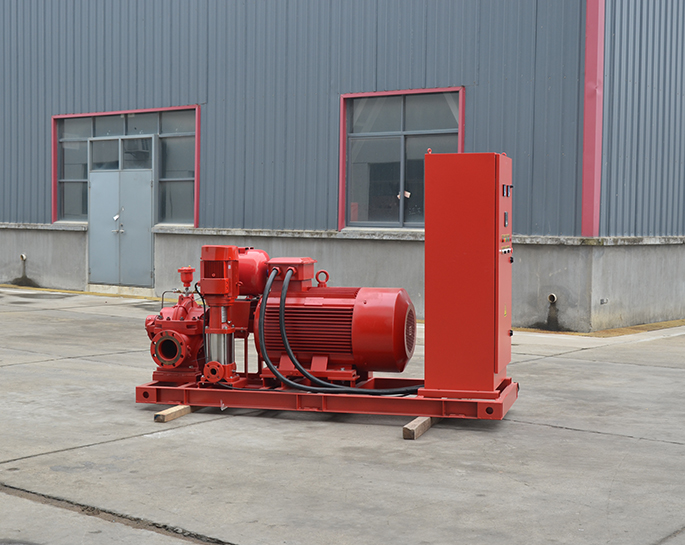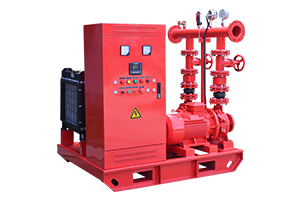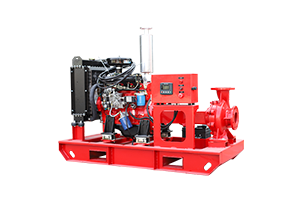What are the different types of fire pump controllers, and how do they function?
Jan 25, 2024
Share:
Fire pump controllers are essential components of fire protection systems, ensuring that fire pumps operate effectively when needed. There are several types of fire pump controllers, each with specific functions. Here are some common types:
1. **Manual Fire Pump Controllers:**
- *Function:* These controllers require manual activation by an individual. When a fire is detected, someone must manually start the fire pump to supply water to the fire protection system.
2. **Automatic Fire Pump Controllers:**
- *Function:* These controllers automatically start the fire pump when a fire is detected. They are often connected to fire detection systems, such as smoke or heat detectors, triggering the pump activation when an alarm is triggered.
3. **Electric Fire Pump Controllers:**
- *Function:* Electric fire pump controllers use electricity to start and control the fire pump. They are commonly used in buildings with a reliable power supply.
4. **Diesel Engine Fire Pump Controllers:**
- *Function:* These controllers are designed to start and control fire pumps driven by diesel engines. They provide an alternative power source in case of a power outage, making them suitable for locations with unreliable electricity.
5. **Jockey Pump Controllers:**
- *Function:* Jockey pumps maintain pressure in the fire protection system between alarms. They operate automatically to ensure that there is always a sufficient water supply at the required pressure.
6. **Combined Fire Pump Controllers:**
- *Function:* Some controllers integrate multiple functions, combining manual and automatic controls, or combining both electric and diesel engine controls.
**Basic Functions of Fire Pump Controllers:**
- *Start/Stop Control:* The controller starts and stops the fire pump as needed based on signals from fire detection systems or pressure sensors.
- *Pressure Maintenance:* Some controllers, especially those for jockey pumps, maintain system pressure within desired limits.
- *Alarm Monitoring:* Fire pump controllers monitor the system for any issues and activate alarms if a fault or failure is detected.
- *Power Source Management:* Controllers manage the power source for the fire pump, whether it's electric or diesel-driven, ensuring a reliable water supply.
It's important to note that the specific features and functions of fire pump controllers can vary depending on the manufacturer and the requirements of the fire protection system. Regular maintenance and testing are crucial to ensure the controllers function properly in case of a fire emergency.

1. **Manual Fire Pump Controllers:**
- *Function:* These controllers require manual activation by an individual. When a fire is detected, someone must manually start the fire pump to supply water to the fire protection system.
2. **Automatic Fire Pump Controllers:**
- *Function:* These controllers automatically start the fire pump when a fire is detected. They are often connected to fire detection systems, such as smoke or heat detectors, triggering the pump activation when an alarm is triggered.
3. **Electric Fire Pump Controllers:**
- *Function:* Electric fire pump controllers use electricity to start and control the fire pump. They are commonly used in buildings with a reliable power supply.
4. **Diesel Engine Fire Pump Controllers:**
- *Function:* These controllers are designed to start and control fire pumps driven by diesel engines. They provide an alternative power source in case of a power outage, making them suitable for locations with unreliable electricity.
5. **Jockey Pump Controllers:**
- *Function:* Jockey pumps maintain pressure in the fire protection system between alarms. They operate automatically to ensure that there is always a sufficient water supply at the required pressure.
6. **Combined Fire Pump Controllers:**
- *Function:* Some controllers integrate multiple functions, combining manual and automatic controls, or combining both electric and diesel engine controls.
**Basic Functions of Fire Pump Controllers:**
- *Start/Stop Control:* The controller starts and stops the fire pump as needed based on signals from fire detection systems or pressure sensors.
- *Pressure Maintenance:* Some controllers, especially those for jockey pumps, maintain system pressure within desired limits.
- *Alarm Monitoring:* Fire pump controllers monitor the system for any issues and activate alarms if a fault or failure is detected.
- *Power Source Management:* Controllers manage the power source for the fire pump, whether it's electric or diesel-driven, ensuring a reliable water supply.
It's important to note that the specific features and functions of fire pump controllers can vary depending on the manufacturer and the requirements of the fire protection system. Regular maintenance and testing are crucial to ensure the controllers function properly in case of a fire emergency.







